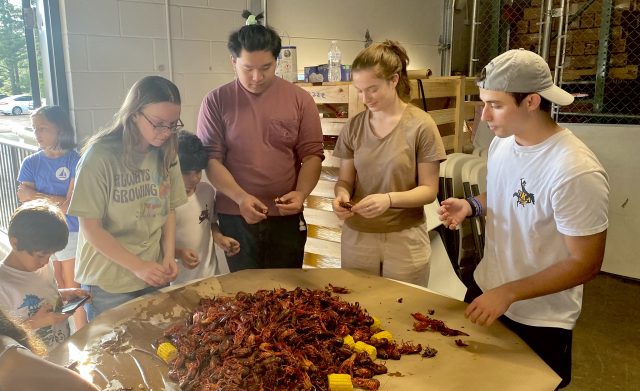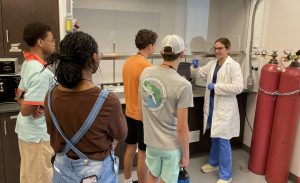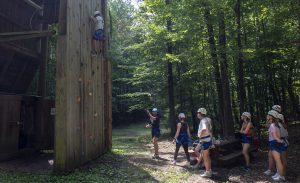
Nanoengineering Summer Research Experience for Undergraduates Program participants (right to left) Anthony Radka, Elisa Pierpaoli, Yinshan Hong and Elly Strockbine enjoy a crawfish boil to support Chloe Sharp and Hong’s water filtration system project as part of the summer program. The project involves crushing crawfish shells and mixing them into clay bricks. Photo by Debbie Nelson/Office of Research and Sponsored Programs
OXFORD, Miss. – A program at the University of Mississippi School of Engineering is offering undergraduate students an opportunity to pursue research projects this summer.
Funded by a $403,106 grant from the National Science Foundation, the Nanoengineering Summer Research Experience for Undergraduates Program enables students to participate in a variety of research, professional development and social activities over 10 weeks on campus.
“One of our main goals for the program is to reach underrepresented or under-resourced populations,” said Nikki Reinemann, assistant professor of biomedical engineering and REU organizer. “For example, some of our students are from community colleges, where they may have not had the opportunity to conduct research before this experience.”
The 2023 cohort includes four Ole Miss students and 10 students from institutions across the U.S. This is the first summer that the program, which began in 2019, has been NSF-sponsored.
“We want to improve the STEM education outreach and research environment here on our campus – more collaboration, more interactions between graduate students and faculty on our campus,” said Thomas Werfel, assistant professor of biomedical engineering and REU organizer. “It’s also a recruiting tool.
“Many of the external students don’t even have regional ties. We try to give them a good experience on our campus and give them a reason to come back and do graduate school here.”

Katherine Nevils, a rising senior biomedical engineering major from Winnfield, Louisiana, performs a lab demo for high school students during her time in the Nanoengineering Summer Research Experience for Undergraduates Program last summer. Submitted photo
The REU, which runs from May to late July, allows participants to join the lab of a faculty member whose research interests align with their own. Examples of summer projects include developing a drug delivery device with attention to manufacturing detail; development of membranes for filtration; and using computational nanoengineering to illustrate protein modeling.
The program culminates with a poster session where the students present their work.
Oxford native Chloe Sharp, a rising sophomore at Rensselaer Polytechnic Institute in Troy, New York, is working with Matteo D’Alessio, assistant professor of civil engineering. Her focus is on a water filtration system that consists of clay bricks with different geometries and additives that the team is studying to see which are most effective in filtering contaminants from water.
“I’m an environmental engineering major – that’s kind of niche,” Sharp said. “I really wanted to make sure that’s what I wanted to do before continuing on in my academic career.
“I thought I liked it before coming in – I’ve always been really passionate about water filtration – but this hands-on experience has really solidified that for me.”
Yinshan Hong, of Columbus, is a rising junior environmental geoscience major at Mississippi State University.
“I wanted to have an opportunity to do research since I had never done it before,” Hong said. “This is a very new experience for me and I’m happy that I get to dive more into this side of my education.”
Hong is joining Sharp in the water filtration project, working under Hunain Alkhateb, associate professor of civil engineering. He is tasked with designing and 3D-printing the clay bricks for the system.
While at Ole Miss, the students take part in research seminars, professional development, networking workshops and social activities such as trail hiking and a ropes course. One of these activities was surprisingly connected to the water filtration system project.
“I actually hosted a crawfish boil because we’re using the shells in our research,” Sharp said. “Their shells have a lot of chitin in them, which has good absorbent properties – especially of heavy metals.

Besides research seminars, professional development activities and networking workshops, REU participants enjoy social activities such as trail hiking and a ropes course. The 2023 cohort took to the Rebel Challenge Course in mid-June. Photo by Srijita Chattopadhyay/Ole Miss Digital Imaging Services
“Crustacean shells have been studied for this, but not a lot of research has been done on crawfish specifically. I wanted to bring it back to Mississippi locally, and crawfish is something that can be found all over. So, it kind of ties it back to why we are specifically doing this research.”
The team selected crawfish shells to wash, oven-dry for 24 hours, then grind into a powder to mix into clay for the 3D-printed bricks. They will add sawdust, as well as graphene in partnership with the Center for Graphene Research and Innovation.
Sharp said the water filtration system will be contained in a standard rectangular cooler. The filtered water is collected by opening the drainage spout of the cooler.
“We are putting gravel on the bottom, then a layer of sand and then a layer of bricks, another layer of sand, another layer of bricks, another layer of sand, and then we are running water through that system,” she said.
Past REU participants have praised the program’s ability to set them up for success after graduation. Kate Nevils, a rising senior biomedical engineering major at UM, worked during the summer of 2022 on a project involving potential solutions for treatment-resistant depression.
“As I plan on attending medical school, this program equipped me with several opportunities to enhance my teamwork skills and strengthen my dedication to innovating modern-day drug delivery,” the Winnfield, Louisiana, native said.
Emily Kerivan, a 2023 biomedical engineering graduate from Bethlehem, New Hampshire, was also part of the 2022 cohort.
“I was able to independently troubleshoot and identify how to conduct meaningful research,” Kerivan said. “We also had another REU student as well as a high schooler from the ARISE program in the lab and it was great to connect with them. We still text occasionally to update each other on our lives.
“Technical writing and seeing a difficult project through long term will both be essential in my career as a quality engineer at Abbott in Scottsdale, Arizona.”
This material is based upon work supported by the National Science Foundation under Grant No. 2148764.